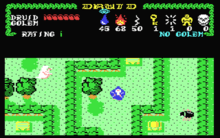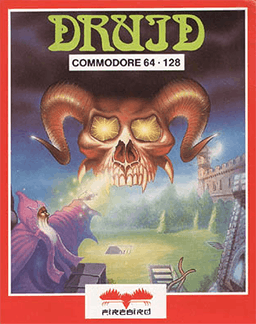Druid (video game)
| Druid | |
|---|---|
|
Cover art | |
| Developer(s) | Vortex Software |
| Publisher(s) | Firebird |
| Designer(s) | Dene Carter[1] |
| Programmer(s) | Andrew E. Bailey |
| Artist(s) | Dene Carter |
| Composer(s) | David M. Hanlon |
| Platform(s) | Amstrad CPC, Atari 8-bit family, Atari ST, Commodore 64, ZX Spectrum, Amiga, MSX2, Tatung Einstein, Famicom Disk System |
| Release | 1986 |
| Genre(s) | Action-adventure |
Druid is an action-adventure game developed by Vortex Software and published by Firebird in 1986 for the Atari 8-bit family and Commodore 64, also ported to Amstrad CPC and ZX Spectrum. The game was ported by Nippon Dexter for the MSX in Japan-only in 1988. Another Japanese port of Druid entitled Druid: Kyōfu no Tobira (ドルイド 恐怖の扉) was made for the Famicom Disk System by Jaleco in 1988.[2] The game was followed by Druid II: Enlightenment and Warlock: The Avenger.
Game

Inspired by the arcade game Gauntlet,[3] Druid is a fantasy-themed action-adventure game, where the player plays the part of Hasrinaxx, a druid who is trying to rid the world of the dark mage Acamantor and his army of demons. To do this, Hasrinaxx must travel through several levels.
The first level is a normal landscape, and the ones after that are underground, each one deeper than the previous. Each level is infested with various enemies such as ghosts, giant insects, witches, and the four demon princes. Hasrinaxx can shoot these enemies with three different weapons: water, fire, and electricity, but they all come in a finite supply and are not equally effective on all enemies. Hasrinaxx can also summon a golem to help him, or turn invisible for a brief period. In the Commodore 64 version, a second player can take control of the golem using joystick port 2.[3]
References
- ↑ "Lemon - Commodore 64, C64 Games, Reviews & Music!". Lemon64.com. Retrieved 2014-05-13.
- ↑ "データベース1988-3". Geocities.jp. Retrieved 2014-05-13.
- 1 2 Review-O-Matic (2009-03-27). "Blog Archive » Druid (C64)". Review-O-Matic. Retrieved 2014-05-13.
